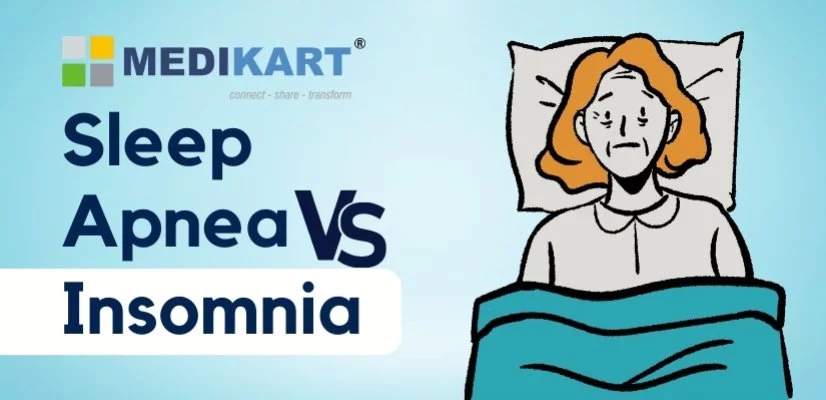Insomnia is the “repeated difficulty with sleep initiation, duration, consolidation, or quality that occurs despite adequate opportunity and circumstances for sleep, and results in some form of daytime impairment.” Essentially, it’s the inability to fall and stay asleep through the night, despite having the right conditions for sleep. Sleep apnea, on the other hand, is a condition in which you continuously wake up from your sleep due to a shortage of oxygen to the brain. When you sleep with obstructive sleep apnea, a portion of your soft palate collapses, restricting airflow. As a result, your brain sends a signal to your body to wake up.
Symptoms of sleep apnea and Insomnia
Insomnia and sleep apnea can cause poor sleep quality and have a number of similar symptoms. The effects of not getting a good night’s sleep are similar in both diseases – drowsiness or fatigue during the day, headaches, and so on.
Aside from that, the most obvious signs of insomnia are difficulty falling asleep, waking up throughout the night, or waking up too early.
Signs and symptoms of Sleep Apnea are:
- Excessive daytime sleepiness
- Loud snoring
- Episodes of stopped breathing during sleep
- Abrupt awakening accompanied by gasping and choking
- Dry mouth and/or sore throat
- Morning headache
- The diminished focus during the day
Causes
Enlarged tonsils or adenoids are the most common cause of obstructive sleep apnea in children. Obstructive sleep apnea is linked to the following symptoms in adults:
- Obesity
- Older age
- Alcohol use
- Smoking
- Using sedatives
- Snoring
- Sleeping on your back
Insomnia affects between 10% and 30% of people globally, however, some studies imply considerably higher percentages.
The following are some of the factors that may increase your chances of having insomnia
- Age
- Sex (women are more likely to develop insomnia than men)
- Occupation (shift workers who work unusual hours have higher insomnia rates)
- History of the family
- Sleep deprivation
- Depression and anxiety
- Medications
Treatments for Sleep apnea and Insomnia
Insomnia
Cognitive behavioural therapy is an effective treatment for insomnia. It assists people in identifying and eliminating ideas and behaviours that interfere with their ability to sleep. It includes:
- Identifying and eliminating elements that lead your mind to reject sleep, as well as developing consistent sleep routines.
- Associating the bed and bedroom with sleep rather than other activities such as watching TV or working.
- Using muscle relaxation techniques, breathing exercises, and biofeedback to reduce anxiety before night.
Patients with severe insomnia for whom behavioural therapy doesn’t prove effective may be administered medication. Self-medication or the use of over-the-counter medications, on the other hand, is often in low dosages and for short periods of time and can cause more harm than good.
The treatment options for moderate sleep apnea are similar, with a focus on altering lifestyle factors. This could imply:
- Losing weight can help relieve swelling tissues and, as a result, lessen airway obstruction when sleeping.
- Tobacco consumption should be reduced since it can assist reduce inflammation and fluid retention in the upper airway, making breathing easier.
- Reducing alcohol consumption, and thus preventing excessive throat muscular relaxation, which might lead to airway blockage.
Apart from these, CPAP (continuous positive airway pressure) devices are an excellent alternative for people who suffer from obstructive sleep apnea (OSA). These devices can enhance airflow in the throat, keeping the airway from contracting as you breathe. CPAP machine’s price in India and globally is very affordable.
Disclaimer
The information provided is for general knowledge only. Consult your doctor for personalized advice and treatment. Medikart HealthCare not liable for any actions taken based on this info.

